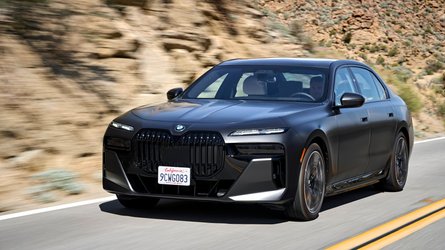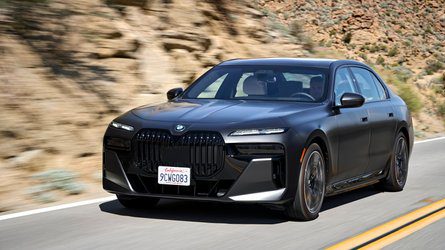The BMW i7 is one of the latest all-electric car models available in the United States, boasting a range of up to 318 miles (512 km). Announced in April 2022, deliveries in the US began in November, strengthening BMW’s electric lineup. The i7 is powered by a 107.8-kilowatt-hour (kWh) battery, out of which 101.7 kWh is usable, and a dual motor, all-wheel-drive system with a total output of up to 400 kilowatts (kW). This setup allows the car to accelerate from 0 to 60 miles per hour in just 4.5 seconds.
The EPA combined range of the i7 depends on the wheel size and varies between 296 to 318 miles. The 2023 BMW i7 xDrive60 19-inch has a range of 318 miles (512 km), while the 2023 BMW i7 xDrive60 20-inch has a range of 296 miles (476 km), and the 2023 BMW i7 xDrive60 21-inch has a range of 308 miles (496 km). Energy consumption numbers (including charging losses) allow us to estimate that in each case, the EPA highway range should be above 300 miles (303-328 miles).
The average energy consumption (including charging losses) of the entry-level version is 89 MPGe or 379 watt-hours per mile (235 Wh/km). With larger wheels, energy consumption will be slightly higher.
The BMW i7 xDrive60 is a premium product with a six-digit price tag. The car starts at over $120,000 (including the destination charge) and is not eligible for the $7,500 federal tax credit. It will be interesting to see how competitive the i7 is in comparison with other electric cars from a similar price range, like Audi e-tron GT, Lucid Air, Mercedes-Benz EQS, Porsche Taycan and Tesla Model S.
FAQ
Q1: Are electric car batteries recyclable?
A1: Yes, electric car batteries are recyclable.
Q2: Are electric car chargers free?
A2: It depends on the charger and the location. Some electric car chargers are free, while others may require a fee.
Q3: Can electric car batteries be rebuilt?
A3: Yes, electric car batteries can be rebuilt with the right tools and knowledge.











